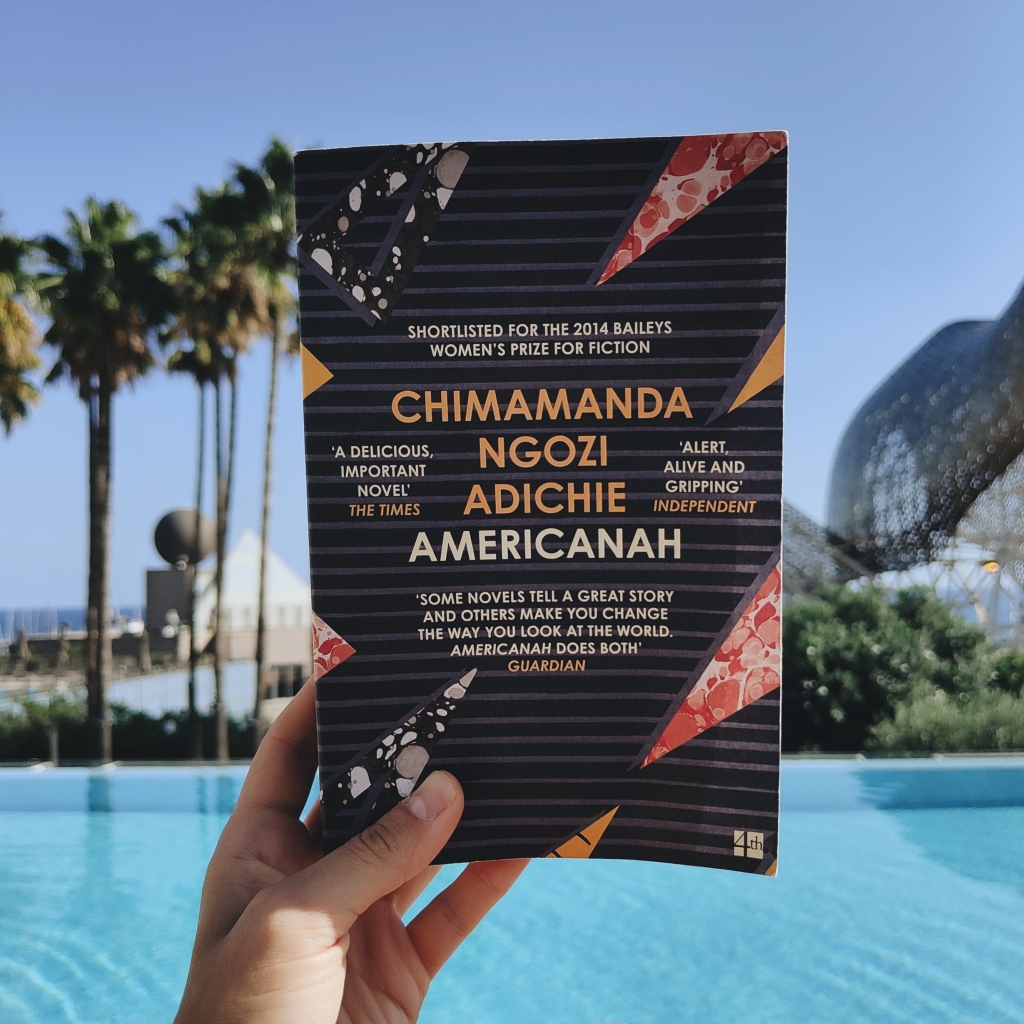While writing the review almost a year after I have started reading the book, I’m relying on the passages that I highlighted since I didn’t take notes back when reading it. The only phrase I noted down when I was reading “Americanah” in 2022 was, “It has soul, heart, depth, you don’t want it to end and don’t want to let it go“, which summed up the impression the book left well.
First things first, I think that you have to bring along a lot of patience when reading this book. It took me about a month to get through it and I felt like it could have been much better if it was shorter. This was also the only reason why I decided to settle on a 4/5★ rating. There were times when I had to force myself back into reading and I wouldn’t have finished the book without that. Nevertheless, I did really like its structure, the jumps in time and how the narrative was held together by revealing what would happen in the future in advance.
One of the things that left the biggest impression on me, was its style, the choice of words and many beautiful phrases that I highlighted. The author definitely has a way with words, crafting fascinating expressions, which made me curious to get my hands on her two other novels, “Half of a Yellow Sun” and “Purple Hibiscus“.
She liked that he wore their relationship so boldly, like a brightly coloured shirt.
p. 63
[O]n Sundays, she loved to drive herself because the roads were empty, Lagos became a gentler version of itself, and the people in their bright church clothes looked from far away, like flowers in the wind.
p. 420
Another big theme within the book was displaying what life in Nigeria, and specifically in Lagos, is like. It’s something that I appreciate in books a lot, presenting a whole new world to the reader, one that is outside of what one is used to, allowing us to broaden our horizons.
When I started in real estate, I considered renovating old houses instead of tearing them down, but it didn’t make sense. Nigerians don’t buy houses because they’re old. A renovated two-hundred-year-old mill granary, you know, the kind of thing Europeans like. It doesn’t work here at all. But of course it makes sense because we are Third Worlders and Third Worlders are forward-looking, we like things to be new, because our best is still ahead, while in the West their best is already past and so they have to make a fetish of the past.
p. 436
Among this tale divided between two countries, the US and Nigeria, a central topic was the perception of identity. Where you feel like you belong and due to which circumstances. Finally, so many passages dealt with racial issues, demonstrating the current day reality, the issues in the societies we live in and how much more progress still needs to be made in order to achieve equality instead of racial discrimination. Some observations hit really close to home, since I have heard them being expressed the exact same way by acquaintances, especially one situation about Paris:
My friend who was born and raised in France of Togolese parents pretends to be Anglophone when she goes shopping in Paris, because the shop attendants are nicer to black people who don’t speak French. Just like American Blacks get a lot of respect in African countries.
p. 331
The only reason you say that race was not an issue is because you wish it was not. We all wish it was not. But it’s a lie. I came from a country where race was not an issue; I did not think of myself as black and I only became black when I came to America.
p. 290
What the whole story was rounded off with, was the narrative about a relationship that stretched over decades and which was told in an incredibly believable way. It displayed human flaws, showed how human beings can change and develop in different directions from each other. I really appreciated that it was drafted in such a realistic way, instead of being portrayed as a cheesy and superficial love story.
If you have already read the book and have enjoyed it, I feel like Reni Eddo-Lodge’s “Why I’m No Longer Talking to White People About Race” could be a great continuation, if you’re looking for a non-fiction piece of writing that deals with similar topics. Certain passages in “Americanah” reminded me of it, when blog posts were written out, and through the mentioned book, you could also get a European glimpse into the issues around race and racism. Another one I instantly thought of, was Emma Dabiri’s “Don’t Touch My Hair“. If you have become curious about the topic of non-European hair and the history around it, this book provides a unique deep-dive on that.

★★★★☆ (4/5)
Edition: ISBN 978-0-00-735634-8
4th Estate, 2017 (originally published in 2013)